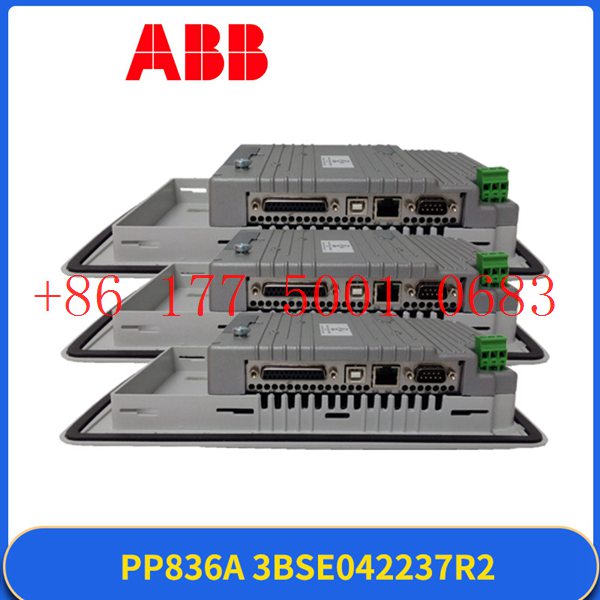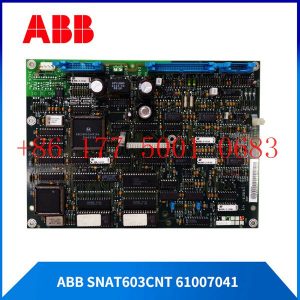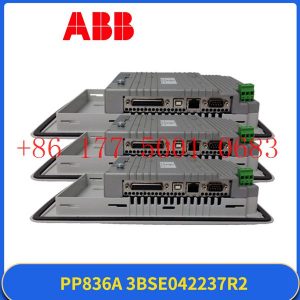Description
hardware flow control. It is an ideal choice in the field of industrial automation.
Although it was established only a few months ago, ABB Future Lab has already cooperated with Huawei to
complete the AI training of garbage sorting robots in two months. This robot uses AI technology based on Huawei
chips and uses industrial cameras to sort objects.
Obviously, adjusting the business model and organizational structure is an important reason why ABB has
lways been at the forefront of the industry.
From technology iteration to application implementation, ABB aims to provide complete solutions
As a pioneer in manufacturing automation and digitalization, ABB”s products in the automation field are constantly
improving, and its application industries are also expanding.
In Alf”s view, the structure and construction of automation have not changed much in the past 30 years. From signal
collection and information transmission to work scenarios or operational interfaces, the flow of information in automated systems has basically not changed.
But the arrival of 5G may change the way information is transmitted between devices. 5G’s characteristics such as large
capacity, high reliability and low latency make it possible to realize independent connections between devices. If real-time
mainline connection can be achieved and installed on the cloud or platform, it will be a more disruptive application.
5G will not only change the way ABB operates, but is also likely to introduce digitalization into the industry, including digital
operation and maintenance. ABB has launched an industrial Internet solution called ABB Ability, which firstly provides a platform
, and secondly, it includes all ABB”s digital cloud products, such as equipment industrial solutions and transportation solutions.
In addition to digitization, another focus of Alf is the autonomy of machines. He took the autonomous management of
autonomous driving and warehousing as examples to think about the development process of machine autonomy –
from human operation to machine operation, and ultimately to autonomous implementation and testing without the need for humans at all.
For ABB, in addition to popular autonomous driving technology, industrial production scenarios also have strong
demand for the autonomy of machinery and equipment, such as autonomous docking of ships and the mining industry
. In some industrial scenarios represented by mining, toxic gases and substances in the working environment are
harmful to the human body, so equipment
is required to have the ability to enter and leave the mine independently. ABB first needs to study the value proposition
of these businesses, discover potential applications, and then discover in which fields it can be applied.
A technology close to autonomy is artificial intelligence. Since its birth in the 1960s, it has been attracting people”s
attention, and there have been endless discussions about “robot replacement”. After decades of development,
related technologies have gradually matured, and more and more AI technologies have begun to be discussed
in the application field. The products and technologies
of leading manufacturers such as ABB have attracted much attention.
ABB has been applying AI technology to its products for 20 years, but its current mature products are mainly
diagnostic applications based on traditional statistics. Alf introduced to Yiou New Manufacturing that
as part of the diagnostic solution, this technology is mainly used to implement condition monitoring functions
. More mature applications are reflected in the automated management of equipment, such as the electronic
management of ships.
Machine learning is another promising AI technology. At the World Artificial Intelligence Conference at the
end of August this year, ABB demonstrated a coffee workbench composed of a two-arm collaborative robot Yu Mi.
Through guided programming of YuMi, the collaborative robot can learn and
remember the barista”s movements to complete the complete process of making coffee, latte art and delivering it to the audience.
In actual implementation scenarios, this technology is used to transform terminals carrying containers. By simulating the
location and status of box handling, the collected data is used to train the AI, allowing the AI to know the
location of the container, thereby achieving automation.
From automation, digitalization, autonomy and artificial intelligence technologies, ABB is not a blind pursuer of
emerging technology concepts. It pays more attention to customer needs and actual implementation, and achieves
better solutions through different product combinations.
There are two major difficulties in balancing R&D and business and implementing solutions.
As a commercial company, ABB still needs to consider the balance between R&D investment and revenue.
In Alf”s view, they do not have unlimited R&D resources, so they need to focus on finding a balance between
improving original product functions and developing new functions. In terms of technology research and development,
we also need to try to focus on projects that can bring the greatest value to the company.
Regarding the specific implementation of digital solutions, Alf believes that there are currently two main difficulties.
The first difficulty is that ABB cannot just develop a general solution, because different industry segments
have different needs, so it must design solutions that suit their different needs. ABB not only needs to master
knowledge in different fields and different applications, but also needs to consider the availability of data.
The second difficulty lies in the use of data, because AI requires a large amount of data training. On
the one hand, ABB needs to encourage customers to provide data for training models; on the other hand,
ABB also needs to ensure customers the privacy, ownership and security of their data.
“Industrial artificial intelligence needs to be combined with models and data. But the most
important thing is that we must provide value to customers through the use of AI, otherwise we will just
apply technology for the sake of applying technology.” Alf concluded.
https://www.xmamazon.com
https://www.xmamazon.com
https://www.plcdcs.com/
www.module-plc.com/
https://www.ymgk.com
PMC008A 700502 RAMIX PMC to Mezzanine Adapter
IS200PMCIH1ABA GE Printed Circuit Board
IS215UCVEM08B GE PROCESSOR BOARD
8AC120 B&R ACOPOS plug-in module, CAN interface
SCYC51020 58052582H ABB FIRING UNIT CARD
3500-42M 176449-02 Bently Nevada Proximitor/Seismic Monitor
8AC110 B&R ACOPOS plug-in module, CAN interface
SCYC51010 58052515G ABB FIRING UNIT CARD
SR750-P5-G5-S5-HI-A20-R-T GE 750 Series Feeder Mgmt Relay
CLS208 WATLOW ANAFAZE temperature controller
P4LQA HENF209736R0003 ABB Control Board
FBM230 P0926GU FOXBORO COMMUNICATION MODULE
6105-WA-PDPS PROSOFT WIRELESS PROFIBUS GATEWAYS
6104-WA-PDPM PROSOFT WIRELESS PROFIBUS GATEWAYS
SPASI23 ABB AI Module
SPS5785 51198651-100 HONEYWELL Power Supply
1C31194G01 WESTINGHOUSE alve Positioner Electronics Module
MVME147S-1 MOTOROLA MPU VME Module
F650-G-N-A-B-F-2-G-1-HI-C-E GE Feeder Protection & Bay Controller
A6140 9199-00058 EMERSON Controller module
3664 TRICONEX Digital Output Module
AIM0006 2RCA021397A0001F ABB Card board
K9203A 996920360 HIMA Heat dissipation fan module
K9203 996920302 HIMA Heat dissipation fan module
S72402-NANANA KOLLMORGEN Servo Drive
SK827005 SK827100-AS ABB CONTACTOR EH550-30-11 480V 60Hz
AIP591 YOKOGAWA Transceiver Control Unit for V net Repeater
SR469-P5-HI-A20-E GE Motor Management Relay line
AIP171 YOKOGAWA Transceiver Control Unit for V net Repeater
D136-002-005 D138-002-002 MOOG Controller module
TP830 3BSE018114R1 ABB Baseplate for Processor Module
TB852 3BSC950263R1 ABB RCU Link Terminator
5SHX1445H0001 ABB semiconductor module
F8650X HIMA CPU Module
F8627X HIMA Ethernet Communication Module
F8627 HIMA Ethernet Communication Module
F8621A HIMA CPU Module
F7131 HIMA Power Supply Monitoring
F7126 HIMA Power Supply Module
VE3007 KJ2005X1-BA1 12P4375X012 MX Controller
TPMC815-11 TEWS ARCNET Interface Module
TC-4000-S ATLAS DC Controller QST







Reviews
There are no reviews yet.